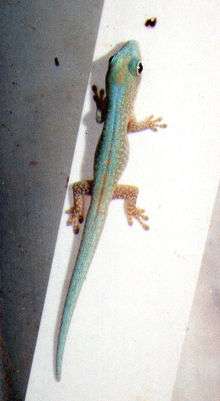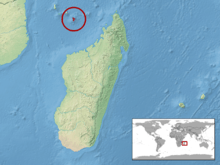Robert Mertens' day gecko
| Robert Mertens' day gecko | |
|---|---|
 | |
| Scientific classification | |
| Kingdom: | Animalia |
| Phylum: | Chordata |
| Class: | Reptilia |
| Order: | Squamata |
| Family: | Gekkonidae |
| Genus: | Phelsuma |
| Species: | P. robertmertensi |
| Binomial name | |
| Phelsuma robertmertensi Meier, 1980 | |
 | |
Robert Mertens' day gecko (Phelsuma robertmertensi ) is diurnal species of geckos, a member of the family that lives on the Comoros and typically inhabits banana trees. Robert Merten's day gecko feeds on insects and nectar.
It is named after German herpetologist Robert Mertens.[2]
Description
This lizard species is one of the smallest of its genus. It can reach a total length of about 11 centimetres (4.3 in). The body colour can be dark green or bluish green. An orange mid dorsal stripe extends from the head to the tail. The sides of the neck as well as the flanks are greyish brown.
Distribution
This species inhabits only a small area on the island Mayotte (Comoros).
Habitat
Phelsuma robetmertensi is often found on banana trees and in abandoned vanilla orchid plantations.
Diet
These geckos feed on various insects and other invertebrates. They also like to lick soft, sweet fruit, pollen and nectar.
Reproduction
At a temperature of 28 °C (82 °F), the young will hatch after approximately 49–53 days. The juveniles measure 19–22 millimetres (0.75–0.87 in).
Care and maintenance in captivity
These animals should be housed in pairs and need a well planted terrarium. The temperature should be between 25–28 °C (77–82 °F). The humidity should be between 75 and 100%. In captivity, these animals can be fed with crickets, wax moth larvae, fruit flies, mealworms and houseflies.
References
- ↑ Glaw F; Hawlitschek O (2011). "Phelsuma robertmertensi ". IUCN Red List of Threatened Species. Version 2012.1. International Union for Conservation of Nature. Retrieved 22 August 2012.
- ↑ Beolens B, Watkins M, Grayson M (2011). The Eponym Dictionary of Reptiles. Baltimore: Johns Hopkins University Press. xiii + 296 pp. ISBN 978-1-4214-0135-5. (Phelsuma robertmertensi, p. 176).
Further reading
- Henkel F-W, Schmidt W (1995). Amphibien und Reptilien Madagaskars, der Maskarenen, Seychellen und Komoren. Stuttgart: Ulmer. ISBN 3-8001-7323-9.
- McKeown S (1993). The general care and maintenance of day geckos. Lakeside, California: Advanced Vivarium Systems.
